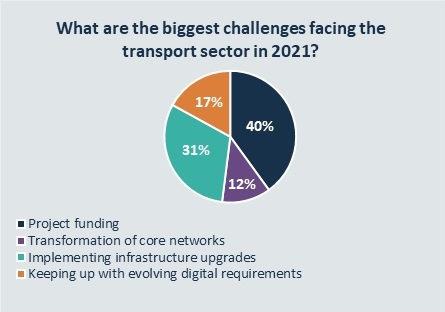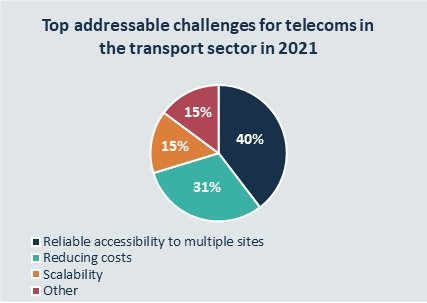🕒 Article read time: 2 minutes
Driving transformation in the transport sector
Sponsored content

Amelia Streeter-Smith, Transport Account Director, Neos Networks
The transport sector is often an early adopter of digital technology, focusing on efficiency, improved services and sustainability. Restrictions on travel and movement since the start of the pandemic brought this to an abrupt halt, with digital transformation ambitions stagnating and priorities shifting towards immediate health and safety concerns.
Yet as restrictions ease, more challenges lie on the horizon. As businesses look to optimise their overheads and operational costs and employees consider a permanent reduction in commuting; changing travel habits in the UK will force the industry to continue to adapt.
During March and April 2021, Neos Networks conducted industry research to analyse the current state of the transport sector, looking into how challenges can be supported by further digital transformation and connectivity infrastructure.
THE BARRIERS TO CHANGE
Unsurprisingly, the respondents highlighted funding as the biggest challenge facing the transport sector in 2021. With budgets cut and reduced revenues, progress on major projects such as Crossrail, HS2 and the Road Investment Strategy has been hit.

The top addressable challenges for telecommunications within the transport sector also illuminated some of the key problems to solve to allow digital transformation projects to thrive once again.

From the results of the survey, three core themes stood out as having the biggest impact on transport’s digital ambitions this year:
- Funding and cost reduction (both capex and opex) – access to funding has been seriously impacted during the pandemic. Currently, there is no understanding of the long-term impact this will have in ensuring the UK’s travel network remains sustainable and modernised.
- Multi-site accessibility – accessibility across multiple sites grows increasingly challenging as organisations remain reliant on Global System for Mobile Communications (GSM), 4G and 5G networks to maintain connectivity for field-based staff.
- Physical implementation of infrastructure upgrades – particularly poignant for rail companies, as critical infrastructure needs to be ‘always on’. Keeping existing infrastructure live whilst new infrastructure is implemented can increase the cost to upgrade while ensuring continuity of service.
BUILDING A NETWORK TO SUPPORT THE NATIONAL NETWORKS
At Neos Networks, we believe in taking the complexity out of connectivity and simplifying UK networks. We can help navigate the main connectivity challenges for transport to improve connectivity on the move and multi-site accessibility with our network management and optimisation services, such as SD-WAN and IP-VPN.
Our fast-growing UK network is ideal for rail companies in need of physical infrastructure upgrades. By the end of 2021, we will have a total of 550 unbundled exchanges on-net, reaching more locations than ever before. We also understand the importance of resilience along transport routes - our network is responsible for critical national infrastructure, such as the work we’re doing with Telent for the Maritime and Coastguard Agency (MCA) to deploy a resilient Ethernet network directly into 165 remote radio sites around the UK coastline, keeping them online 24/7, 365 days a year.
*neosnetworks.com
Published On: 15/07/2021 16:00:40

Comments Section
If you are a Logistics UK member login to add comments.